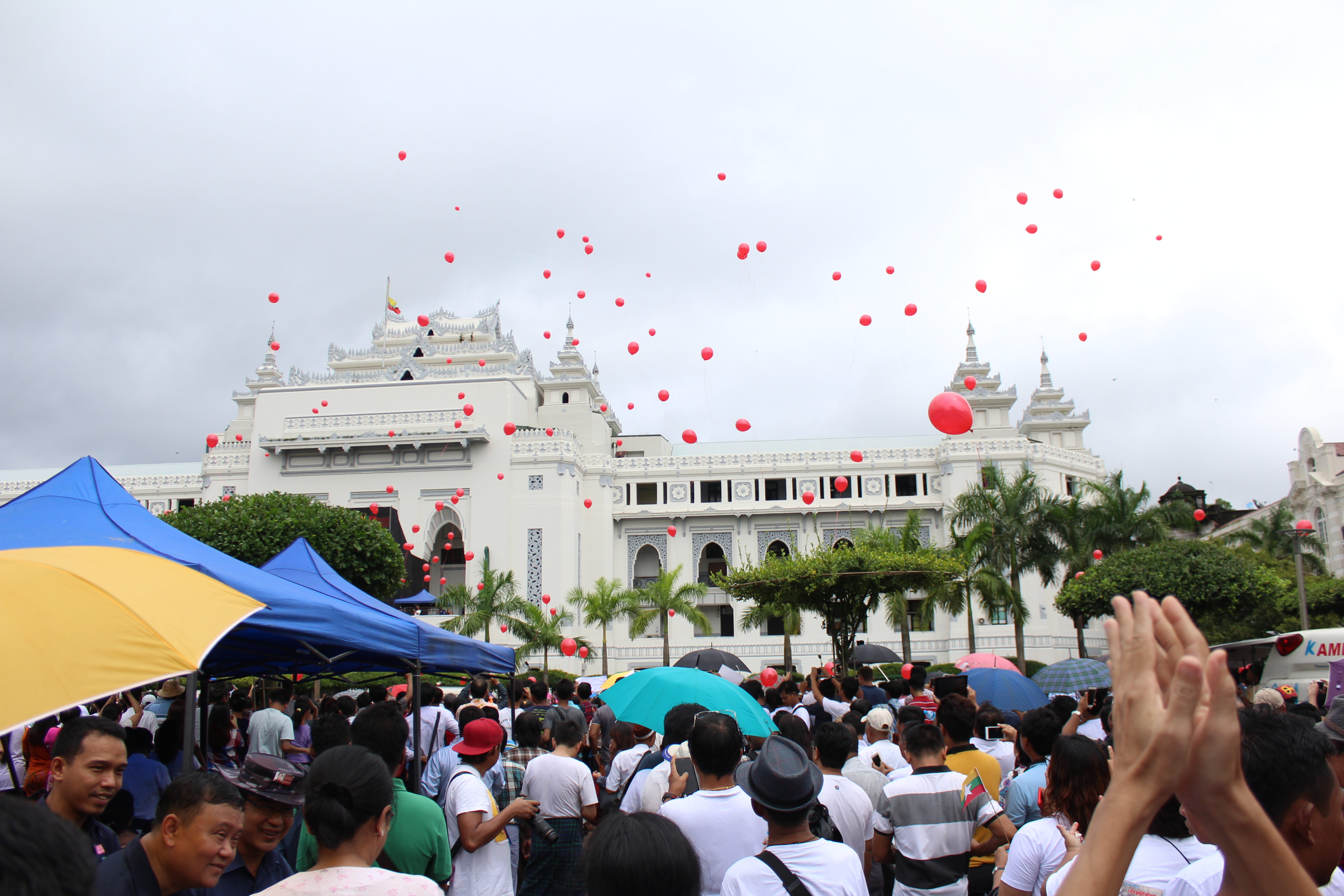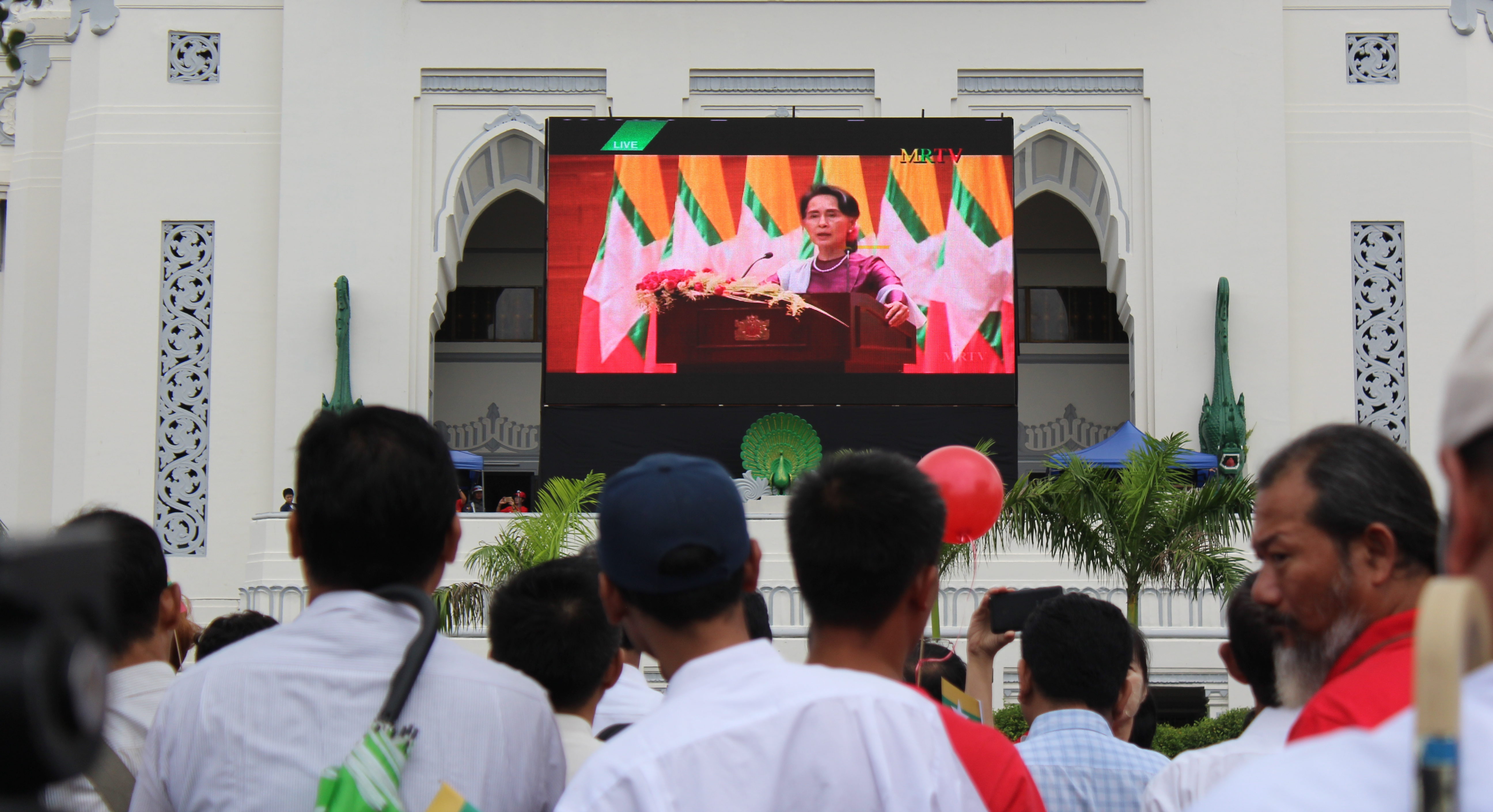Hundreds of people gathered outside Yangon’s City Hall this morning waving flags, releasing balloons, and bopping gleefully to techno music. They were waiting for the big screen mounted on the building to come on and broadcast a highly anticipated speech by Myanmar State Counsellor Aung San Suu Kyi about the situation in Rakhine State.
Right out of the gate, Suu Kyi’s speech revealed that not only does she not recognize the displacement of a third of the country’s Rohingya population – over 410,000 people – as an emergency, but she also does not grasp the nature of emergencies or the illogic of her own analogies. This did not seem to bother anyone in the crowd.

Suu Kyi framed the problems her government faces as ones that must be resolved through the pursuit of “democratic transition, peace and stability, and development.”
“People expect us to overcome all these challenges in as short a time as possible,” she said. “I think it is only fitting that I should remind you that our government has not yet been in power for even 18 months… Eighteen months is a very short time in which to expect us to meet and overcome all of the challenges that we have been expected to do.”
But the diplomatic pressure that has been heaped on Suu Kyi over the past three weeks has not been in response to a lack of peace and development in general; it has been in response to a specific military campaign – one that rights groups and foreign governments alike call “ethnic cleansing.”
It would not have taken 18 months for the Myanmar government to honor the rights of the Rohingya to freedom of movement, humanitarian aid, and, if not citizenship, at least a normal life under the protection of Myanmar’s laws.
It would not have taken 18 months for Aung San Suu Kyi’s ministry to grant visas to the UN-mandated Fact Finding Mission established to investigate allegations of atrocities committed by Myanmar security forces in Rakhine, Shan, and Kachin states earlier this year.
James Gomez, Amnesty International’s regional director for Southeast Asia and the Pacific, said in response to Suu Kyi’s speech: “Contrary to Aung San Suu Kyi’s claims, Rohingya are essentially segregated in Rakhine State, effectively denied citizenship, and face severe barriers in accessing health care and other basic services. Refugees who have fled to Bangladesh cannot return to this appalling status quo.”
It would not have taken 18 months for Myanmar’s State Counsellor to at least acknowledge these problems.

Another way in which Suu Kyi tried to marginalize the unique plight of the Rohingya today was by positing that their suffering it not as grave as the world believes.
She said: “I think it is very little known that the great majority of Muslims in the Rakhine State have not joined the exodus. More than 50 percent of the villages of Muslims are intact. They are as they were before the attacks took place, and we would like to know why.”
She urged her audience to “not just [look] at the problems but also [look] at those areas where there are no problems.”
This is misleading. While there are villages where Rohingya have stayed, they are not without problems that are perpetuated by the Myanmar government. Rohingya activist Nay San Lwin told Coconuts that even in these villages, food is scarce, and everyone is prepared to leave at a moment’s notice. That notice is often given when a neighboring village goes up in flames.
Furthermore, he said, the Rohingya who have remained in the downtown areas of northern Rakhine State were “begged by the authorities to stay.”
“We can arrange for you to visit these areas,” Suu Kyi told the diplomats during her address.

Finally, the most interesting way in which Aung San Suu Kyi made it clear that she does not recognize the unique suffering of the Rohingya was through a botched rhetorical flourish that brings to mind the refusal of some in the United States to recognize institutional racism.
“We would like you to think of our country as a whole, not just little afflicted areas,” Suu Kyi said toward the end of her address. “I would like to use the analogy of a healthy human being. A healthy human being has to be healthy all over. You cannot neglect his general health just to concentrate on one particular ill.”
This analogy has been heard around the world, in many iterations, but always making the opposite argument.
#AllLivesMatter is like I go to the Dr for a broken arm and he says “All Bones Matter” ok but right now let’s take care of this broken one
— Big C (@djsoap92) July 6, 2016
saying #AllLivesMatter is like running through a cancer fundraiser & saying “THERE’S OTHER DISEASES TOO”
— send judes (@judychen_) July 8, 2016
As Daniel Victor put it in the New York Times last year: “Those in the Black Lives Matter movement say black people are in immediate danger and need immediate attention, like the broken bone or house on fire. Saying ‘All Lives Matter’ in response would suggest to them that all people are in equal danger, invalidating the specific concerns of black people.”
This is not the first time Suu Kyi’s rhetoric has been compared to the denial of institutional racism in other parts of the world. Even Daily Show host Trevor Noah accused her of sounding like Donald Trump when she equated the fear felt by the Rohingya to the fear felt by Buddhists in Rakhine State.

The State Counsellor filled her speech with the same inspiring tautologies that decades ago earned her the anxiety of Myanmar’s military rulers and the love of people around the world.
“Hate and fear are the main scourges of our world.”
“All of us want peace rather than war. We want harmony rather than conflict.”
Generalizing a problem in order to ignore a specific emergency works like a charm for people in power when their followers are on board. Just as millions of Americans don’t want to be told to sympathize with minorities, most people in Myanmar are beyond convincing that the lives of the Rohingya depend on their sympathy.
Watching the crowd outside City Hall throw a mini-rave before and after they heard Aung San Suu Kyi trivialize the pain of the world’s most persecuted people made it clearer than ever that the struggle for real justice inside Myanmar will be long and torturous. But it will only begin once at least one person in the crowd suggests that death and displacement are no occasion for a dance party.


